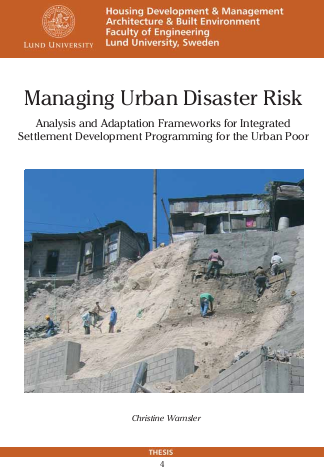
The research is driven by the need to provide a better understanding of the challenges of increasing risk and its impact on the living conditions of the urban poor, as well as to provide new conceptual and strategic approaches to face those challenges. Such approaches are especially required within the pre-disaster context. Technically speaking, they come under the heading of ‘adaptation’ or ‘ex ante disaster risk management’ and include measures both for risk reduction and risk financing. With this in mind, the overall research objective is to enhance and develop new knowledge and innovative ways in which urban development actors can contribute more effectively to disaster risk management, thus demonstrating their role and potential within this field. The overall research question can thus be framed as: how can disaster risk management be properly integrated into settlement development programming (i.e. social housing, upgrading and/or local urban governance programmes)? To answer this question, the following three areas were investigated: (a) the existing interlinkages between disasters and urban settlement development, more specifically, between disasters and building and planning practices related to low-income settlements; (b) the current relationship between the working fields of disaster risk management and settlement development planning; and (c) the possibilities for overcoming existing challenges and gaps in order to increase the potential of settlement development programming to reduce and transfer or share risk.
Resource collections
- UN Habitat - Urban Response Collection
- Urban Response - Urban Crisis Preparedness and Risk Reduction
- Urban Response Collection - Community Engagement and Social Cohesion
- Urban Response Collection - Economic Recovery
- Urban Response Collection - Environment and Climate Change
- Urban Response Collection - Housing, Land and Property
- Urban Response Collection - Urban Crisis Response, Recovery and Reconstruction
- Urban Response Collection - Urban Resilience